#subversive women of the Bible
Text
dungeon meshi fandom rant
i usually stay away from fictional autism headcanons or indulging in them wholesale because i'm more on the 'characters are constructs' side of things. some may exhibit traits we relate to but placing real-world diagnostic labels on walking metaphors makes things too nebulous. however laios touden is an exception to me since autism allegories are pretty hard-wired into both his arc and dungeon meshi's core themes. so for once the fandom autism memes feel genuine to me lol. it doesn't feel as fanon-heavy or platitudinous, actually it's pretty uplifting. i appreciate the positivity.
that being said the most dogshit dunmesh take i've seen lately is the assertion that laios and falin show us autistic men are villified for things autistic women are accepted for. the fuck are you people smoking? some rebranded MRA-pilled bullshit? log off tumblr and go outside, then point and show me where this is the truth. i don't know if you guys are all living in a feminist utopia that i'm not privy too, but if so send me the address because things couldn't be less like that everywhere i've ever been.
countless times i've been told 'oh you're exactly like a female copy of [socially inept male friend/co-worker/family member who shares my personality] and then i gotta watch them get special treatment as i get left behind and scolded for not being normal enough. him being blunt is rebellious & brutally honest, me being blunt is just being a b*tch with no filter. how many times do you see autistic women reaching high positions of power and being revered as a misunderstood genius.
how about everyone reminding us to 'be nice' to the supposedly harmless awkward guy who keeps making sexual comments & invading our boundaries because he can't help it apparently. but strangely enough, i have gone my whole life without creeping on others. only to be called creepy and off-putting by these same social equality preachers for not applying makeup or styling my hair right. autistic women are more likely to be sexually harrassed and/or abused than neurotypical women and no one gaf (let's b real they don't care when it happens to neurotypical women either if the man has a good enough sob story.) shit like walking strangely, having a speech impediment and talking too much about esoteric topics was enough to be outcasted for us. once more, with feeling: what are you people smoking?
and critically, falin is pretty. she's conventionally pure, self-sacrificial, beautiful with hollywood curves, soft-spoken, and never questions anyone nor asserts herself over others when her needs aren't being met. her dislikes in the adventurer's bible are 'nothing in particular', she never spoke out against her village's bullying even when she had it worse than laios, quickly forgives her parents for exiling her, and never shows any opinion on marcille's use of dark magic. she's a paragon of femininity. anything less than that, and she would probably invoke similar if not more disgust from her peers than laios through the audacity of not conforming to gender expectations. but she likes holding bugs or whatever so...whoa! she's so feral and subversive amiright guys. but crucially she looks cute while doing it so we're not too uncomfortable to stan.
i love laios so much, he's in my newest blorbo collection for sure but calling the female characters who don't like him judgemental is not a good look. we as the readers who have been inside the main chara's head know he's a good guy - but in the context of dungeon meshi's world, where sexism is as prevalent as stranger danger, it's fair for them to assume bad intent and keep their distance. they're looking out for their own safety and you're mad about that because, what, it makes your 2D nigel sad? cry about it.
so quit using anime characters as fodder for your thinly-veiled 'everyday men milk themselves' preaches. the touden siblings are not a good example of this. if you unironically agree with that take: it's time to go talk to some real women broski.
#EVERYDAY MEN MILK THEMSELVES !!! laios wishes smh#i criticise falin's treatment because i think she has potential & deserves more autonomy beyond her chimera form#the hype cannot convince me she's much more than a lucy westerna archetype :( but that's a whole essay for another day#so it's unfair to use her as 'proof' the woman is treated better when she upholds high standards of what we should be to deserve acceptance#and from that meta lens the cast's love becomes conditional; it hinges on her continued passivity
8 notes
·
View notes
Text
Whatever route women took to self-authorization and whether they were religiously inspired or not, they were confronted by the core texts of the Bible, which were used for centuries by patriarchal authorities to define the proper roles for women in society and to justify the subordination of women: Genesis, the Fall and St. Paul. Since male objections to women thinking, teaching and speaking in public were for centuries based on biblical authority, the development of feminist Bible criticism can be seen as an appropriate and perhaps not unexpected response to the constraints and limitations imposed upon women's intellectual development by religiously sanctioned gender definitions. These biblical core texts sat like huge boulders across the paths women had to travel in order to define themselves as equals of men. No wonder they engaged in theological reinterpretation before they could move on to other, more original and creative ideas.
It may also have been the case that women took up Bible criticism mostly because the Bible was the one text available to them. If so, their act of critique and reinterpretation would be a prime example of their subversion and transformation of patriarchal doctrine, in itself a feminist act. Such an act implies that the person engaging in reinterpretation considers herself fully authorized and capable of challenging expert theological authority. It is amazing to see how woman after woman engaged in such criticism without reference to theological authorities and without apology. The same women who endlessly apologized for their audacity in writing or teaching, confidently corrected Church fathers, popes, priests and preachers. Usually they offered their own version of God's intent, not, as the mystics did, on the basis of special revelation but simply because they reasoned as they did and believed they had every right thus to reason. There is no stronger evidence available to show that there always were women who never accepted the patriarchal gender definitions which defined them as inherently inferior and incapable of reasoning. Long before organized groups of women challenged male authority, the feminist Bible critics did just that. Without making any special claims for their right to preach or teach, women simply did both, appropriating the Bible and using it for their own purposes. The long trail of evidence of this process, to be found in the work of most European women writers over many centuries, is only the tip of the iceberg. For every woman who wrote in this manner, there must have been many, anonymous and unknown, who thought that way and taught their children that way.
-Gerda Lerner, The Creation of Feminist Consciousness
4 notes
·
View notes
Text
the thing is. yes the bible is from 2000 years ago yes it often passively assumes prevailing gender norms rather than critiquing them (altho there are subversive elements like 'no longer male or female in Christ' - scholars seem increasingly convinced Paul was quite egalitarian and encouraged female leadership in churches!)
but you will never convince me on the other hand that the Bible actually actively cares that much about gender the way those books on Godly manhood and femininity want you to think. The NT is decidedly uninterested in idolatry of family or sex and romance in general, and in the OT just by pure dint of not having consorts and dalliances w human women and what not God actually reads as a remarkably gender neutral figure imo, compared to stories about the male and female creator gods having sex to birth the world or whatever.
I just don't see where you can make the case that big picture story of salvation level gender is something that matters to God. The Genesis man-woman creation narrative maybe, household codes in the epistles, but it's just... not an important part of anything really? The idea that living a Godly life is very deliberately gendered just does not compute to me.
15 notes
·
View notes
Note
What is your ideology, if you had to put a name to it? Also some of your posts about Jesus confuse me as my knowledge of the man is of someone who practiced non violence and encouraged His followers to do the same. Am I wrong or just missing important pieces of context?
My ideology….. Hah let’s say Nationalist and keep it like that. When Jesus drove the money lenders and their animals from the temple and the temples court yard, He used violence.
“And He found in the temple those who sold oxen and sheep and doves, and the money changers doing business. When He had made a whip of cords, He drove them all out of the temple, with the sheep and the oxen, and poured out the changers’ money and overturned the tables. And He said to those who sold the doves, ‘Take these things away! Do not make My Father’s house a house of merchandise!’ Then His disciples remembered that it was written, ‘Zeal for Your house has eaten me up’” (John 2:14).
A whip of cords is in modern terms a whip made from either cords of animal leather or thick fibre cords, He sat there premeditated to commit violence and made a whip.
Other examples of Jesus using violence or exhibiting violent behaviour(Luke 8:33, Matthew21:22)
He declared: “But these enemies of mine who did not want me to reign over them, bring them here, and slay them in my presence” (Luke 19:27).
Yes Jesus was non-violent, turning the other cheek is applicable only in your trust circle(tribe, family and loved ones, closest of friends), doing that constantly towards foreign elements means Christianity would have died off centuries ago. We are humble men and women on this earth, we cannot even compare ourselves to the holiness of Jesus, we are mortal we have ambitions of grandeur, conquest and building something that lasts the test of time. Christianity is both the Old Testament and the New Testament.
And again anon to reiterate Violence is a Tool, it’s encoded in human nature, it is biblical. Reading the Bible is not an easy task and should not be done mindlessly, not left to googling interpretations online especially in this full age full of subversive elements and liberal Protestant interpretations.
6 notes
·
View notes
Text
Another internal struggle between the World of Darkness of the past, and World of Darkness of today.
Past World of Darkness was considered to be in the, "Screw you, hippie" school of game design. Which is, I think, a label applied most by screwed hippies with sour grapes.
In truth, World of Darkness was a celebration of horror, pop culture and folklore. And sometimes, culture and folklore is not politically correct. It just isn't. You may take umbrige with the idea of some ghost of an aborted or stillborn fetus angry at its mother or other women as some sort of misogynistic or patriarchal phantom of guilt meant to make women feel bad, but you don't get to disinclude it from the big list of adult fables and folklore we get to add to our edgy tabletop game featuring horror and unsavory macabre superstitions.
Culture does not care about your modern day ideas of what is right or wrong or just. It's history, and it is tradition, and it is origin. To censor that because you don't like it is merely to do what Maoist China does; trying to edit shit like the Bible to conform to modern, more socialist ideas about what is right by having Jesus spit out a line like, "No man is perfect and no man can be free of sin. Not even me." You know, the guy who was sent to be sacrificed as the ultimate sinless person. Anyway..
In those years, the big struggle was against domestic religious ubiquity of Christianity that was rallying itself to culture up because it felt like all these non-Christians moving in would change the pluralistic and defacto supremacy of the cultural outlook of the US along with other parts of Europe. So, naturally, the punk and anarch and liberal youth response was to take the real life annoyances of televangelists and those jealous, out of touch middle aged people from the 60s to 90s and depict them as enablers of baby-eating, child raping priests and clandestine abusive religious institutions.
What was en vogue at the time was putting neo-paganism on a pedestal, and that meant whether you liked and vibed with that or not, you trusted the Odinists and the neo-pagans of other cultural "faiths" (that were really just excuses to wear horns and go to concerts and engage in good ole fashioned orgies) more than you trusted or tolerated your everyday milquetoast religious population. That of course meant an eclectic and often shallow mishmash of misc. European, African and Asian cultural icon traditions, as only ill informed but arguably well intentioned children withj limited access to information and sources will do.
It was WELL known at the time that Odinist or similar European neo-Paganism was often affiliated with white nationalists, but they understood you didn't just throw all that shit under the rug just because some cultural identityless stormfuckers adopted the symbols. It was understood that those symbols didn't belong to the fascists and neo-Nazis, they were appropriated and didn't belong to them. Nobody thought Norse mythology was inherently just a whistle blown for neo-Nazis, it was considered something they illegimately held and were ignored for doing it. Unlike today, where any viking or European Paganist symbols or traditions are considered to be violently subversive white supremacist symbols. Because, didn't you know, WhItE PeOpLe dOn'T hAvE CuLtUrE. It was cringy, but you could at least run games with elements of old elements of folklore and myths played as having a kernel of truth. Now they treat that shit like you want to be a Nazi but just aren't following through.
And it was more liberal, in that you could have figures such as the wendigo chilling and real alongside the damned, demons and the possessed. Something that certain overcompensating people will say is a social no-no, because the icon is "sacred." Well, guess what? To literal billions of people on earth, not a few million, depicting demons is also sacriligious and disrespectful, but the naysayers will scream about how it shouldn't be permitted because it, "trivializes the beliefs of the aboriginal Americas."
I wonder what percent of those aboriginal americans are Christian, today. Anyway..
However, there has ALWAYS been a progressive-to-the-point-of wet blanket element to World of Darkness' writing overtones that contradicted the more liberal narrative and openness for adult subject matter. A grey space where the forces trying to make everything politically correct and "healthy" Vs. realizing the real world is not. And, unfortunately, sometimes this internal strife compromises the game.
So on the one hand you have encouragement to talk about "serious adult subjects and black subject matter," but then on the other, reprimends if you talk about it in a certain way, or contradict someone at the table that doesn't like something depicted any way but one.
And I kind of feel like the writer's room for WoD must just be this uncomfortable minefield of walking on eggshells between the Problem Glasses that don't compromise for anything and have the power to dial up the HR department if they decide disagreement with them is, "lichurally calling for the deaths of LGBT and persons of color" on if red curtains on a canopy bed are sexist or something.
90s WoD acknowledged that there existed a nonpartisan middle America that was neither their avowed enemies or Nazis, and conservatives weren't actually Nazis just because they were conservative. At least, they knew it was a nonstarter and not tolerated to say that aloud, and they didn't want to destroy social capital of people that weren't ideological side choosers by doing that. There were always partisan ideologicals that were more radical anarcho-communist or anarchists that occassionally would get drunk (or some other kind of intoxicated) and decide to use WoD or the social circles to push and platform narrative, but the older guard largely told them to shove off.
Well. Time passes, old guard stop playing or die off. Social circles add new people and lose old ones. This is inevitable. The older culture gets replaced naturally, as well as unnaturally.
But the thing is, World of Darkness as a franchise and the companies behind it tend to grow as these positions are argued to the point of numbness. When WoD first began it was a bunch of drunken cynical goths all over the place, politically incorrect in certain ways, violently volatile against one another, with contradictory schools and factions that wouldn't tolerate one another while preaching that they were tolerant, unlike the conservatives.
As time passed and the game advanced, elements that were introduced that were passe or painfully examples of their time changed, too. Werewolf: the Apocalypse can best be characterized as if the misanthrope psycho that always wears three wolf paw print shirts wrote a game. In it, an entire tribe of Greek amazons called the Black Furies was created just to give the second and third wave feminists something that resonated to anti-male womanness woman dominated culture and space that platformed much of the shit feminist academics were saying.
But as the editions matured, it became less an anti-technology and cowardly hidden anti-capitalist "but don't accuse me of that, you red scare McCarthyist!", anti-industrialist, pro-aboriginal spiritualist messages, and became more a story about how insanity itself has warped the world to self-destruction. It became less an episode of Captain Planet starring jaded goth protagonists.
The meta changes and improves if the writers and spirit behind the game change over time. Here's hoping V5 experiences the same maturation. First edition had may of the same growing pains of overcompensation and hilariously unintentional racism by people that were trying to be anti-racist according to shitty definitions of what it is, at the time.
5 notes
·
View notes
Note
What is the “modern trad” interpretation of Ephesians 5?
I was always taught that (at least in theory) the husband is the leader of the family, but he must always seek the council of his wife and children, and listen humbly to their opinions, and as far as possible come to compromises and mutual consent, and don’t “micromanage” your own family (ie politics, conscience, property), and also instruct and guide and teach and correct them when necessary, and the husband should acknowledge that his wife is a grown adult despite his leadership and trust her with the various things she’s better at than him
Are you talking about the extra misogynist extremists who seek to control their wive’s every movement and believe that women are inherently idiotic and immature compared to men? I don’t like them either.. they scare me..
Yeah, sadly there's a non-insignificant sunset of men who take the most chauvinist possible reading of the passage and use that twisted interpretation as a cudgel towards the family they're supposed to be protecting. A woman who babysat me as a kid and was friends with my parents all through college recently divorced her husband and she told us crazy stories about how he would saddle her with all kinds of chores and expect her to do the shopping, but then not give her money or resources unless she did certain sexual favors for him. And they were super normal all my life, I'd never have suspected her husband was such a wacko control freak. We actually just talked to her recently and she's coming around to visit and minister at our church as a part of her work with an organization that helps prostitutes escape the industry and their pimps
Anyway yeah, that's the kind of crazy stuff I mean when I talk about the "trad" interpretation of this passage. But more than that I think people underplay the radical message of female empowerment the Bible presents to us. This passage is meant to uplift women as equals in a partnership, not as subordinates in a hierarchical structure. I wouldn't even say that this passage presents the husband as a leader, considering all the subversive messaging Paul uses (addressing the women first, presenting the husband as a part of the body and not separate from it), but maybe that's me being a little reactionary to the often draconian interpretation of this section.
Point is there's a lot in this passage, and even people with good intentions ignore a lot of the subtext because they don't know enough about Greek and Roman oration or literary style. Remember kids, every book of the Bible was written to a specific audience at a specific time, not just to you 2000 years in the future!
3 notes
·
View notes
Text
Uncovering the Hidden World of Early Christianity: Exploring Secret Books
youtube
Have you ever heard of secret books in Christianity? These mysterious texts have fascinated scholars and enthusiasts alike for centuries, offering a tantalizing glimpse into the hidden world of early Christianity.
Secret books, also known as apocryphal or hidden books, are writings that were not included in the canon of the Bible. While the Bible contains 66 books in total, including the Old and New Testaments, there are many other texts that were written around the same time and offer different perspectives on Christian teachings and traditions.
Some of the most well-known secret books include the Gospel of Thomas, the Gospel of Mary Magdalene, and the Acts of Paul and Thecla. These texts were discovered in the late 19th and early 20th centuries, hidden away in ancient libraries or buried in the sands of Egypt.
So why were these books excluded from the Bible? There are a few possible reasons. Some were considered heretical by early church leaders, who sought to establish a unified and orthodox version of Christianity. Others simply didn't make the cut for various reasons, such as being too obscure or not having enough widespread support among early Christian communities.
Despite their exclusion from the official canon, secret books have continued to captivate readers and scholars alike. They offer a unique window into the diversity of early Christian thought and practice, revealing a rich tapestry of beliefs and traditions that were not always reflected in the dominant narratives of the time.
Perhaps one of the most intriguing aspects of secret books is their potential to challenge our preconceived notions about Christianity. Many of these texts feature unconventional or subversive ideas, such as the suggestion that women played a more prominent role in early Christian communities than previously thought. Others offer a more mystical or esoteric understanding of Jesus and his teachings, providing a fascinating counterpoint to the more literal interpretations found in the Bible.
Of course, not everyone is convinced of the value of secret books. Some argue that they are simply the work of fringe groups or heretical sects, and that their exclusion from the Bible was justified. Others suggest that they are little more than historical curiosities, offering little insight into the core tenets of Christian faith.
Regardless of your perspective, there is no denying the allure of secret books in Christianity. Whether you view them as heretical texts or valuable insights into the diversity of early Christian thought, they offer a fascinating glimpse into a world that is both familiar and yet strangely different from our own.
Christianity #Secret Books #Apocryphal Books #Gospel of Thomas #Gospel of Mary Magdalene #Acts of Paul and Thecla #Early Christianity #Heretical Texts #Diversity of Thought #Women in Christianity #Mystical Christianity
2 notes
·
View notes
Text
Ruth's archetype is one of the most unique:
The archetype of Ruth is one that happens to be a multi-faceted one not least important for being the ancestor of King David and thus the royal lineage of the Kingdom of Judah in its own self-perception. An equally fascinating bit here is that the Torah bluntly states that no Moabite is welcome in the Assembly of the People of Israel until the nasty Moabite blood was drowned by the tenth generation. Biblically Ruth was but four generations removed from David, meaning that the most famous of all Jewish kings and the Israelite dynasty was something that under Jewish law as precisely written (the Talmud ties itself into a few knots at times over this) was forbidden.
The narrative of Ruth is also one of those that is most open to multiple interpretations. A face-value interpretation from a feminist concept would see her as a classic example of the role of women in patriarchy and in the Biblical concept of it. A more sophisticated reading would note just how many subversive elements there are in the story, and as such it's a good example of how the Bible does not, in fact, prove entirely straightforward in all things.
Not to Jews, at any rate. The Church bowdlerizes the ambiguous parts and treats her as a straight up heroine because of the genealogy of Jesus. She is the most classical 'Judaism sees person X as ambiguous, Christianity doesn't have any ambiguity, only heroes or villains' example.
#lightdancer comments on history#women's history month#the bible and women's history#ruth#judaism and women's history#christianity and women's history
3 notes
·
View notes
Text
Idk how to word this correctly but the hints at christian themes in s4 (which reads to me like the writers are buckling up to showing the real reason for Hawkins' issues) plus the Creels being also hinted at the be a religious family, as were a lot of people back then, seems to be like a deconstruction of the concept of an "anti-christ".
(disclaimer: this is all a result of research I've done so on the likely chance you know much more than I do about Christian theology and the Bible please correct me! I was not raised Christian).
The anti-christ being someone who is evil, the very opposite of Christ. Christ was born of a virgin- the Virgin Mary- just as Virginia means "pure virgin maiden". Reading up on the Annunciation To The Blessed Virgin Mary, she was actually betrothed to Joseph- however she did not live with him and there had not been an official marriage ceremony yet when she fell pregnant with Jesus, hence her being a virgin.
Applying this Virginia, it's the reality for women at the time that they were expected to remain virgins until marriage. Alice is said to be 15 years old and Victor came back from the war 14 years ago... There is a good chance Victor was only betrothed to Virginia before he left for the war only to come back and find that she had a child? It was either break off the engagement and admit that she had a child with another man or lie and say they they committed the 'sin' of premarital sex before Victor had left (if that was possible). Both were not good choices for Victor, but seeing what he had done and witnessed during the war, could he have forgiven Virginia for her betrayal since he had committed worse sins?
Never mind the fact that Victor's favorite song being Dream A Little Dream Of Me... A bit on the nose isn't it?
But Henry wasn't born to a virgin mother (well in this case Alice lol), but a mother who pretended to be a virgin while being a 'whore', the opposite of Christ. In Christian theology anti-christ brings about an apocalypse, it denying Christianity and by association, Christian "structures". An unnatural unchecked structure?

The subtext being here that possibly what he was referring to is religious (Christian) structures and the oppressive hierarchies that resulted from it. The structure that othered him, presented an image of "perfection" that he could not live up to and therefore was considered a "mistake".
So in a subversive sense Henry is the "antichrist" but in a way that he's literally anti oppressive Christian structures. From the perspective of said Christian structures, he is undisputably evil, a disrupter of the "proper" way. "The monster". Because of course you must be one if you oppose all that is good and holy (sarcasm).
However what we do know is that Henry is a victim of the structure. He was othered and outcasted, sent to be "fixed" because he did not abide by it.
2 notes
·
View notes
Text
waiting for a pizza to arrive and for a cake to cool enough to frost in honor of @malafight's birfday
SO gonna start the next episode
s2 ep7 reunion! (last ep of the second season by Netflix's numbering)

she still sleeps on a hard cot, just a pretty one ;_;
but also don't sleep with your hair up like that you will ruin your hair and your hairline omg

but also why do you sleep with A KNIFE
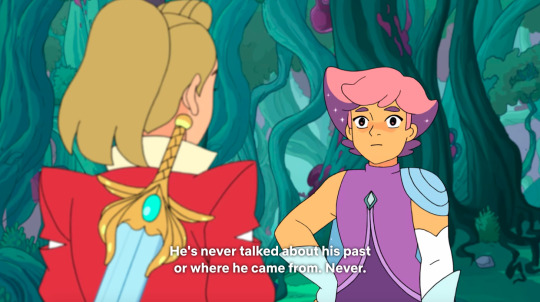
I mean yay this is the episode where we meet Bow's dads but also, again, trans!Bow headcanons stay winning
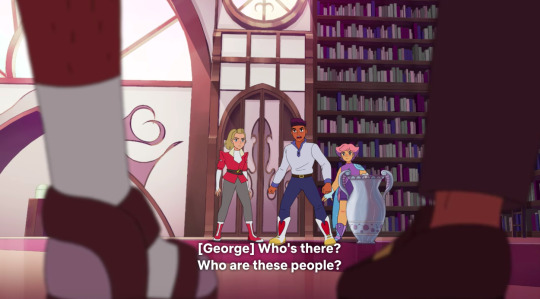
THE SOCKS WITH SANDALS LOLOL
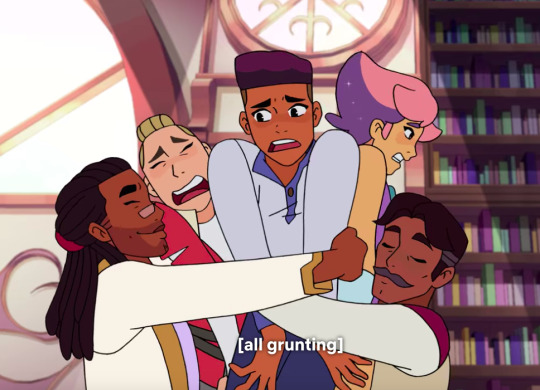
aahaha

bless the animators for this one aaaaahahah (she thought she spotted Shadow Weaver)
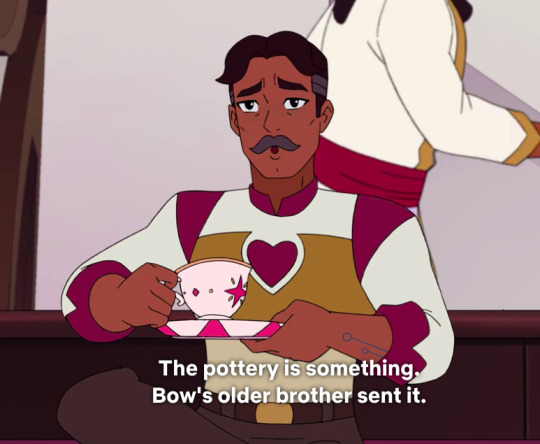
omg he has a First Ones tattoo that's like us having a tattoo in like cuneiform. Or maybe Latin.

THIRTEEN??????

he says, in front of two princesses who are currently involved in a war
plot plot one of his dads fought in the original war and came back to his village destroyed and vowed to never get mixed up "princesses and their war" ever again
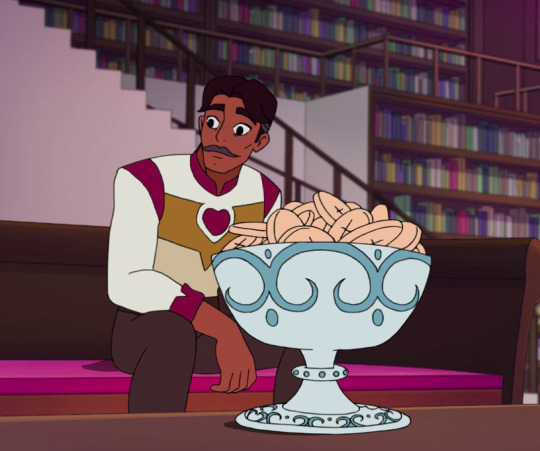
look I know Bow's giving a little speech about his dads but my brain saw this and went "...communion wafers?!"
(my church doesn't even DO wafers we do home-made gluten free bread)
OKAY so I remember when I saw this episode the first time, it occurred to me that in any other show, Bow pretending to go to a boarding school only to ACTUALLY be a rebel fighter would be an obvious analogy for being gay! Oh wait I found that post.
...why does Bow call his dads by their first names
also Adora keeps pronouncing everything in something weirdly close to a bad French accent--like putting the emphasize on the wrong syllables of any given word or phrase on a misguided attempt at sounding smart

another one for the "never pause she-ra" subreddit
also the SOUNDS Catra makes, the voice actor must've really had a good time with this one ahahaha
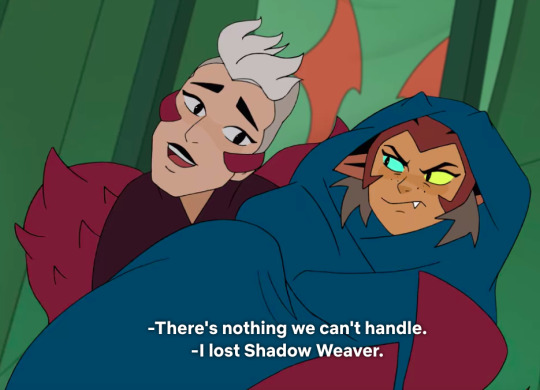
FANGIE (it took multiple tries to get this one)
but yeah Scorpia's attempt at comfort/cuddling did lead to Catra shouting her actual problem so it kinda worked
but yeah Hordak's little recorder baby heard the whole thing
BACK TO BOW'S DADS
cackling at them correcting "She-Ra." "We think it was 'Her-Ra'"
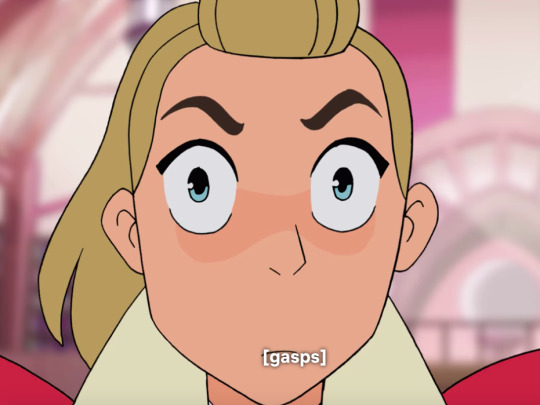
....i'm gonna have to edit the reddit post to add this one
Watching Bow's dads argue about whether Serenia was a real person sounds like people arguing over whether people from the Bible were real lol (for the record: in some cases we have outside evidence they existed and in some cases we do not)
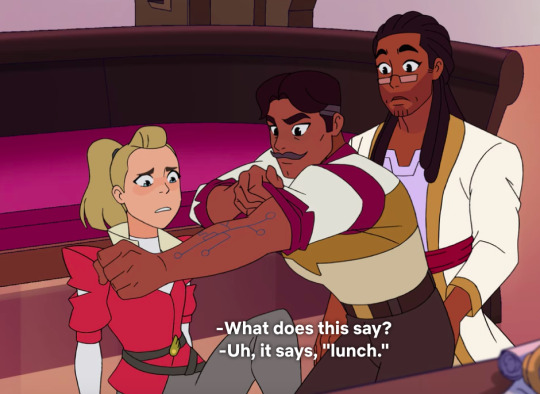
DON'T GET TATTOOS IN LANGUAGES YOU CAN'T READ, FOLKS (without multiple people confirming the meaning)
also WHY can she read this stuff? did Shadow Weaver teach her? I forget
Bow's dads have a First Ones artifact, they ask Adora what it says, turns out it's a password (Eternia!) and it OPENS and--
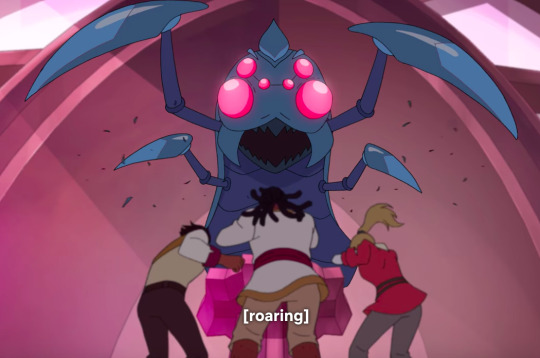
whoops!

can we just enjoy the fact that three men are hiding behind a table while two women kick this monster's ass???
the monster just wanted the gem runestone shard they had sitting on display in the library and now it's a nice chill orb again
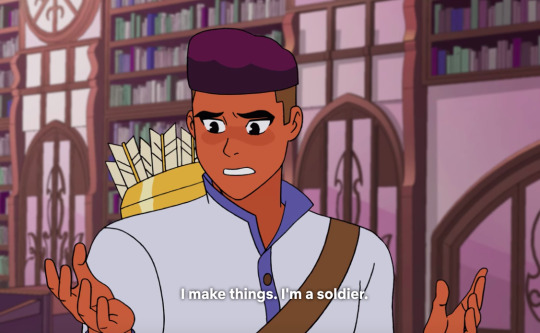
As someone who, again, was a child in the 1980's, the subversion of some tropes is just very, very pleasing.
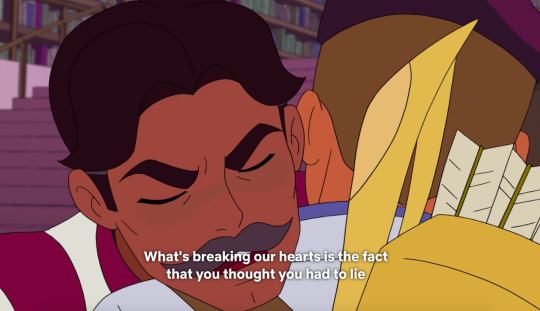
That, and the sheer degree to which this is a HUGE analogy for coming out. Like. They hit all the narrative beats of people who are scared to come out only to find out their parents are actually fine with it.
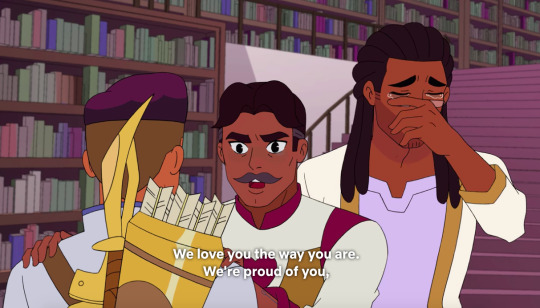
On a personal note: when I was 25 and told my mom I had a girlfriend, her response was, and I quote, "Ew!" To which I responded: "Why are you picturing it, mom?!"
My dad figured out I wasn't straight before I told him, the same way a lot of people did, which was that I was (am) completely unsubtle about checking people out. (My brothers told me about this, side note; they'd overheard him trying to convince my mom I was bisexual and my mom kept saying "but she's had so many boyfriends" and my dad and brothers were like "do you know what bisexual means???")
That said when I realized I was gay and not into men anymore, I told my dad in the kitchen on Christmas after a couple glasses of wine by just blurting out completely apropos of nothing, "I think I'm just gay," to which he responded with a shrug and "Yeah, alright." Like, sure it could've gone better but also tbqfh it could've gone worse, so I'll take it.
(As mentioned on previous posts my dad is dead. My mom is completely chill about my partners.)
on a related note:

oh right this is when we lean Etheria doesn't have stars--up to that point I know I'd just interpreted the lack of stars in the night sky shots as like, an artistic choice
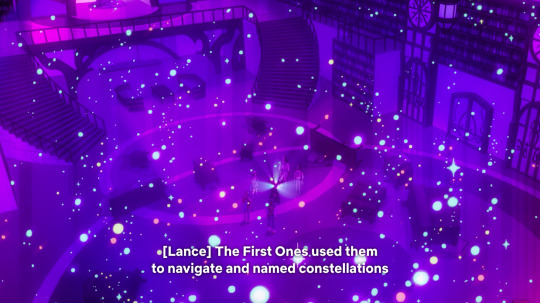
plot plot Serenia is a constellation that only appears over the Crimson Waste in the summer (oh they DO have seasons) and Bow's dads beg them not to go
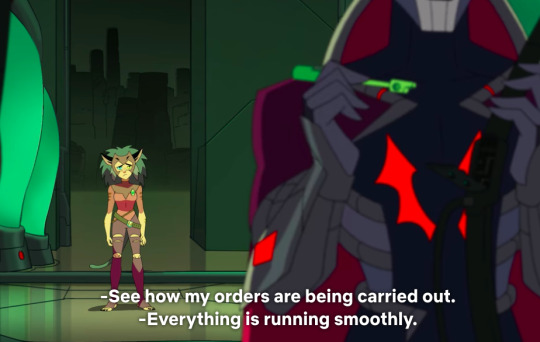
Catra's just really cute here
anyway the little recorder critter plays Catra admitting to losing Shadow Weaver, Hordak uses a fancy magical device to suck all the air out of the space Catra's standing in and berates her for losing Shadow Weaver and lying about it until Catra passes out.
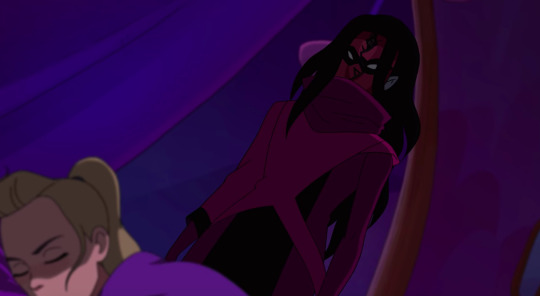
DUN DUN DUNNNNNN
END OF SEASON TWOOOO
Also I'm full of pizza and cake :D
1 note
·
View note
Text
187: Phosphorescent // Muchacho
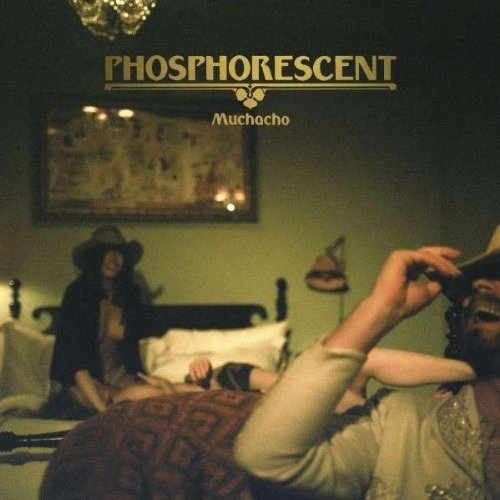
Muchacho
Phosphorescent
2013, Dead Oceans (Bandcamp)
I thought Muchacho was a masterpiece when I first heard it ten years ago, and it’s never really slipped in my estimation. We’re far enough now from the early ‘10s to have our own personal senses of what has and has not lasted—the water level has risen and the mountaintops have become islands. Muchacho is the soundtrack to the wanderings of a mystic with decidedly clay feet, someone whose eyes have been burned from staring too long at the sun in search of God, brimming with sweetness and a fearful need who’ll nonetheless disappear on you without notice for months at a time. A terrible man to date (circa 2010 anyway), in other words, but one with the magnetism that comes from living intensely, as though music, love, bacchanalia, and the soul are matters with real stakes.
youtube
According to singer-songwriter Matthew Houck, the songs arose after returning from a tour and finding his personal life in ruins: “lost the place, lost the girl, lost my mind.” And while depicting yourself on an album sleeve surrounded by multiple women in various states of undress isn’t the greatest mea culpa I’ve ever come across, as an evocation of the state of freedom and fragility that comes when the bottom drops out, Muchacho is captivating. Houck uses ‘Hej’ (sounds like ‘hey’) as his own pet name for God, and borrows the old mystical poetry trick of couching his lyrics as simultaneous addresses to an absent lover and to the divine. There’s a sense of surrender throughout, whether to the thrill of the drive (“Ride On/Right On”), dissolution (“Terror in the Canyons”), or the whirlwind (“A New Anhedonia”). A lot of the language has the taste of Bible leather, but at bottom, Muchacho’s weary vibe can be summed up in the words of its lurching title track:
“I found some fortune, found some fame
I found they cauterized my veins
Hej, I've been fucked up. And I've been a fool
But like the shepherd to the lamb
Like the wave unto the sand
I'll fix myself up. To come and be with you.”
Houck’s plaintive moan and a shimmering fiddle loop that makes time feel simultaneously like it’s hurtling forward and suspended in place have given Muchacho’s best known track, “Song for Zula,” a long afterlife in soundtrack licensing, but there’s something (inadvertently, I think) subversive about a song with “Zula”’s caged, vehement grief turning up on a show like Superstore. What to make of a nostalgic sitcom montage on the importance of finding moments of reprieve at your workaday job being set to a piece that concludes with the words, “And I could kill you with my bare hands if I was free”? That’s what happens when you let a song out into the world—but with any luck a few have followed its silver line back to Muchacho, and found themselves a shade more debauched and enlightened for the trip.
youtube
187/365
#phosphorescent#matthew houck#alt country#americana#psychedelic folk#chamber folk#indie folk#alabama music#dead oceans#music review#vinyl record#'10s music
0 notes
Text

WutBJU found this little gem in the 1968 Vintage.
John Stormer was a featured speaker at Bob Jones University's Bible Conference in 1968. It's BIBLE CONFERENCE. And who does BJU invite?
A fear-monger that could be a model for Ron DeSantis' 2024 Presidential campaign.
The Greenville News reported on it. A transcription with commentary will follow.

"Forty eight hours ago a man was shot down by a sniper's bullet in Memphis, Tenn. Since then, at least 20 people have been killed in violence in 46 cities of the United States. As we meet here tonight (Saturday), troops have the White House and Capitol surrounded to keep mobs from burning it to the ground. We live in a troubled land; we live in a land which is in trouble."
Well, yeah.
Stormer's speech in Rodeheaver was on Saturday, April 6, 1968.
Anybody remember what happened on April 4, 1968? Martin Luther King was assassinated.

Does Stormer mention MLK ever? At all?
Of course not. He's just "a man." Can you even believe it? THE Martin Luther King, Jr. is nothing but "a man" in this Klandamentalist account.
These were the opening remarks Saturday night as John Stormer, author of "Note Dare Call It Treason," spoke to an audience of more than 4,000 at Bob Jones University.
He said that within the last four years more than 150 people have been gunned down in the streets of America; thousands of others injured, more than a billion dollars worth of property burned or otherwise destroyed. "What is behind all the unrest and violence?" Stormer asked.
Oh what could it be? :/
He answered the question by saying that the President's Commission on Civil Disorders says that poverty, lack of economic opportunity, prejudice, and White racism are responsible. "Others, including, J. Edgar Hoover, grand juries in cities wrecked by violence, and police officials, have made it plain that Communists and other subversives have played upon the discontent, which stems from some of these conditions, to provoke the actual violence."
Here's a place to start reading about the Kerner Commission.
But the real problem in 1968 is, of course, a Red problem!
He quoted Hoover as saying that Communists and other subversives and extremists strive and labor ceaselessly to promote racial trouble and take advantage of racial discord in this country. Such elements were active in exploiting and aggravating the riots; for example, in Harlem, Watts, Cleveland and Chicago.
Stormer said that all the rioters are not pro-Communist or anti-American. He quoted the Negro writer Louis Lomax, who after the Detroit riots, said that once the organized revolutionaries break open stores and get the violence started, then the human element begins to play into the hands of the revolutionaries.
And look at Stormer here. Does he sound any different than every white supremacist for the last three years?
Continuing, the conservative author said, "Men and women move in to satisfy their lusts for free cigarettes, free clothes, free booze, and anything else they can carry away. I have studied the cause for riots in the last several years, and I was puzzled for a long time, We have always had poverty in America; there has always been discrimination against any group as they have come to America."
Going back to the depression days, Stormer mentioned that during that time more than 15 million people were unemployed; the communists had a thousand members working actively to promote a revolution; and there were no riots. Why?
"There are two principle differences between then and now," he noted. "In the 1930s it was a certainty that if trouble would break out and looting start, the government would move quickly and forcefully to put down any trouble. This is no longer the case."
Ah, yes! The good ol' days during the Great Depression!
There is a second element, as well. In the 1930s there was still a general acceptance among most of the population that there was at least a possibility that men would have to answer to God for his actions even if he weren't caught by the police. In the 1930s Christians, both black and white, and their churches were still faithful in proclaiming the message of God's judgment to come for all men. This puts a restraint on the natural wickedness of the heart of man.
Stormer told his audience that the function of the Christian was that which Jesus Christ referred do when he told his disciples, "Ye are the salt of the earth." "In the Lord's day," continued Stormer, "salt was used to preserve or to keep meat from getting rotten. If the Christian is serving his function in society, he tends to hold back corruption."
In conclusion he said "Because Christians are not functioning as the salt of the earth and have lost their savor, Christians in all society are being trodden under the feet of men."
Have they ever changed?
1 note
·
View note
Note
Oh dude is A Year of Biblical Womanhood like the Jael version?? I’ve heard that title before but I assumed it was “proverbs 31 woman” “submit to your husband” stuff, so I ignored it. Definitely adding to my Goodreads (and then my StoryGraph as soon as I *finally* set that up)
MARIEEEEE I’m LIVING for this
In classic Katelyn fashion, this will be much longer than necessary or than anyone asked for, but that’s what happens when you give me uncontrolled access to expelling my thoughts into the internet.
In short, yes, it is the Jael version. But it’s also all that fundy stuff, too. Let me explain.
Rachel Held Evans was a blogger of the early 2010s who kind of revolutionized the “exvangelical” movement (although she was slow to break her ties to the evangelical church). She was very open about her upbringing in evangelicalism, her faith crisis and falling out, and her eventual return to religion. She was immensely influential to my own faith journey and really shaped the way I engage with scripture and organized religion. She taught the world that smart girls could love Jesus, ask difficult questions, and still be welcome and celebrated in the Body of Christ. Rachel Held Evans passed away in 2019 and left behind an incredible legacy.
A Year of Biblical Womanhood was a subversive and experimental project of hers. After growing up being told what a biblical woman does or doesn’t do (namely DOES do the dishes and DOES NOT speak in church), she decided to go to the Good Book and find out herself. The book follows her one-year experiment of living biblical womanhood as literally as possible
BUT it’s not all about romanticizing calling one’s husband “master” or exoticizing religious head covering like it looks like on the cover. Rachel is snarky, and this project is about SPITE. Paul says women can’t speak in church, FINE. She WON’T. EVER. And while she’s doing that, she’s researching and discussing and calling her Orthodox Jewish friend and discovering that the Bible is SO empowering.
Proverbs 31 is NOT about being a good little wifey, it’s about celebrating women of valor (eshet chayil!). Ephesians 5:22 is NOT about being subservient to men, it’s about turning the contemporary culture’s views about women on its head. The dominant form of Christianity has allowed conservative American misogyny to decide many peoples’ views on women in scripture, and just like how Jesus overcame the forces of all evil by letting Himself be overcome, Rachel reclaims biblical womanhood by submitting to it: living in a tent on her period, proclaiming her husband’s greatness at the city gate, sitting on her roof to atone for her sins, and all.
So yeah. It’s a good one.
And omgggg you will love StoryGraph I just know it!!
22 notes
·
View notes
Note
That RPF answer was awesome. I'd really love to hear more about the Tijuana Bibles, please?
*breaks knuckles* Time to ramble about junk again, boys.
Tijuana Bibles are little booklets, usually made in the 20s-60s, but some ppl still make them for fun or as art. They're mostly smut, but also have humor, political messages, inappropriate themes, etc. Some of the characters are OCs, some are comic/cartoon characters, and some are well-known figures, like actors. They were illegal, made anonymously, and sold in secret.
They were called Tijuana Bibles to imply that they were smuggled from Mexico. (In line with "Tijuana donkey shows," which also weren't a real thing.) They were also called a lot of other things, like eight-pagers and bluesies. They were sold under the counter or out of ppl's pockets. Organized crime was sometimes blamed, but it's more likely that most printers had presses for making labels and just switched to Bibles as a side gig.
What's important about them - other than the rpf angle - is that they were subversive "low-brow" art, made by regular ppl, for regular ppl. Though they absolutely did make money, they weren't marketable. The art wasn't expected to be consistent, so while some artists were actual pros *cough*Wesley Morse*cough* most of them weren't. The stories were meant to entertain, not to be classics. The creators were diverse (well, more diverse than in commercial products) bc they didn't have to fit any standard. There was no standard. Bibles were trash. Delightful trash, by the ppl, for the ppl.
They're considered by many to be some of the earliest comix, and I agree. Comix - underground comic books that gave a voice to social movement groups, women, the queer community, and other minorities - circumvented the rules for comics via self-publishing and clandestine distributing. If you ask me, and you did lol, that's a significant part of the heritage of fanfic/art as we know it now. Our beautiful mix of voices that would never otherwise be heard, speaking truth and entertaining our small but important audiences.
Going back to the Bibles specifically, the fact that they used various interpretations of beloved characters mixed with OCs makes them fanfic/art. They're tangible proof that we're wired to be inspired (can I get that on a pillow?) and to imagine so much more for the characters we love. They're a historical example of the fact that transformative art doesn't erode the source material, as they had little to no impact on the inspiration.
And they're proof that commercial art, while very valuable, isn't a barometer for our needs or wants. The secret art that we make for each other has always been sexual, dark, humorous, imperfect, gross, bizarre, and free. It embodies the things we aren't getting from "appropriate" media. It's where we find our niche content that no one can afford to publicly endorse. It's our own little world where we escape being told what to look at, and make what we want to look at.
It's also Mae West fucking Popeye. And I think that's beautiful.
28 notes
·
View notes
Text
Perspective: Can redeeming Villanelle make her character less iconic?
Have you ever heard of the Codex Gigas? Also known as ‘The Devil’s bible’, it is the largest illuminated manuscript in the world according to Wikipedia. It is told that a monk made a pact with the Devil himself and feverishly wrote the entire book in one night! As an acknowledgment to his partner he drew his monstrous figure in one of the pages. Said page looks different from the others, as if touched by some malignant magic. Today we know the reason for it: the page suffered the most deterioration for being the most exposed. For centuries people could not get enough of this character: The Devil. Indeed, we have codified ways to save ourselves from the metaphorical Devil – ourselves. We invented sins and crimes to tame something deeply primal within us. Freud called it id, the origin of all that which makes us tick: impulses, instinct, drives, libido. It reckons only two things: pleasure and satisfaction. If we could strip ourselves from all inhibition there would be impulse and sensation. It would be brutal ecstasy. But what would be of the world if all 7 billion of us would uncompromisingly seek to satisfy our impulses? Hell, so we don’t.
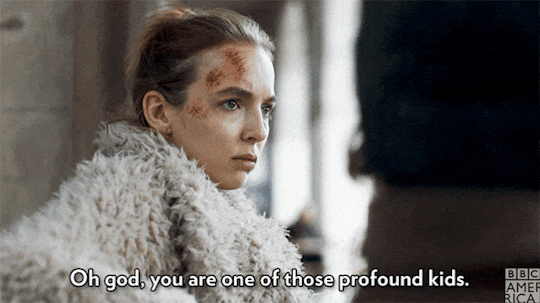
But through art we can glimpse at what this liberation would feel like. Some sort of existential voyeurism. Aristotle would call it catharsis, but what does he know? This is how some of the most remarkable characters were born, they mesmerize us by being their id – unapologetically, terrifyingly, charmingly – like the Devil himself. Characters like Hannibal Lecter, The Joker, Alex DeLarge; they are larger than life, unbind, amoral and extremely bright (and all male). Like Hannibal brilliantly put it in Silence of the Lambs: “Nothing happened to me, officer Starling, I happened” or like the perverted childlike Alex explain in A Clockwork Orange: “What I do I do because I like to do”. As simple as that. Pure satisfaction of impulse because they feel like it. When we, uneased by what they represent, want explanations or justifications, The Joker toys with us, always giving us a different version of his tragic background, as if he knew we want to give him an excuse and, in good joker fashion, he makes a huge joke out of it. They take it very seriously to explain to us what went wrong with them, because it doesn’t really matter.
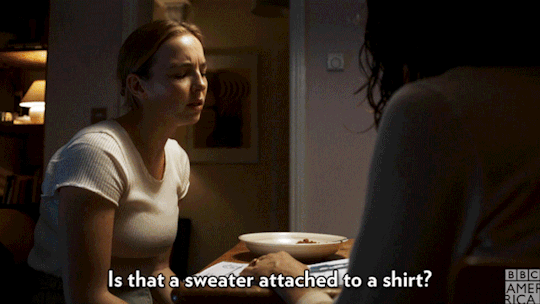
While the id makes us organic, whole creatures, many attributes of it have been culturally dissociated from womanhood. The violent, self-preserving and egoistic impulses were replaced with nurturing, self-sacrifice and compassion – not surprisingly the only impulse afforded to women is motherhood (or sexual desire for the satisfaction of another). Therefore, women cannot fully materialize their humanity. These raging impulses feel alien to womanhood, something imposed on to them by circumstance so severe that it warps the nature of the female itself. Aggressive women are sad and broken, or vengeful, or mad, or sexualized – these are the portrayals we have been conditioned to expect from fiction. When compared to their male counterparts, even mild violence in a female character almost immediately requires an explanation: how someone betrayed them, or abused them, or they were conditioned into it. Rage and aggression are never theirs to own, it is always extrinsically sourced.
On a superficial level, the character of Villanelle doesn’t seem so unique. Immediately one could think of Nikita in La femme Nikita, who was a drug junkie teen, rescued and transformed into a cold-blooded femme-fatale assassin by the shadowy government group “The Centre” after they faked her death to break her from prison (Uncannily similar?). Or the movie Anna by the same writer, where a Russian girl accepts a KGB offer to be trained into an assassin in order to escape her abusive homelife. Or Marvel’s black widow who is also a Russian spy, apparently brainwashed by USSR to become an assassin. Other female assassins include The bride in Kill Bill who set off into a revenge killing spree after being brutally assaulted and left for dead, and other movies I vaguely remember about abused women becoming assassins to seek revenge, or shallow sexy female assassins with no purpose for existing other than being the sexy female assassin. However, all these characters were made into assassins by external factors. Villanelle is set apart from the typical femme-fatale assassin trope by owning her own joy of killing, by the rejection of the broken female narrative and the rejection of the objectifying male gaze. In order to unmistakably ground these traits alienated from women – violence, disregard, cruelty, indifference, sadism, risk-taking – in her nature, the character was written as a primary psychopath. Being an assassin fits her natural talents, not the other way around
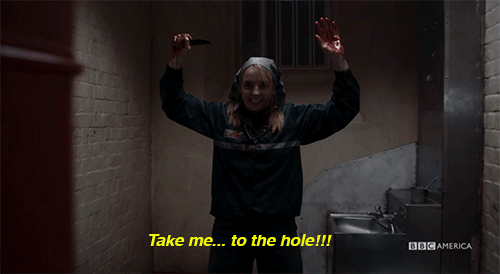
Villanelle could occupy a very special place among a roster of remarkable fictional characters like the ones mentioned earlier. She is the female embodiment of absolute, remorseless indulgence and rage, representing the unashamed satisfaction of women’s impulses, for her own enjoyment alone, with style and wit – A truly magnetic character and fresh perspective. In psychopathic Villanelle, women are allowed to reclaim these violent impulses, which is oddly empowering and humanizing. Give us that. Brilliantly, the cathartic element is mirrored by Eve herself. Eve too sees her unfulfilled and alienated impulses incarnated in Villanelle, which in turn sparks Eve’s exploration of her own identity. Ultimately Villanelle’s seduction to embrace impulse despite its danger is at the core of their electric attraction and conflict.
Thus, by retconning Villanelle in Season 3, the character no longer represents the provoking embodiment of female drive, managing to become an elevated female assassin trope, at best. The challenging take on womanhood, instead plays into all of the expectations. Villanelle is no longer a female true to her nature that gets a kick from being an assassin; but a troubled girl, tortured into becoming a killing machine by a past of abuse. A broken woman who rejects the violence instilled into her once she finds healing. Interestingly, it is not that she merely chooses not to kill but she is unable to carry on the act, signifying the deeper alienation of the violent impulse from her own self – the same impulse that once made her so iconic. This lack of impetus to kill is but a symptom of the decreased character’s libido in general: fewer shopping sprees, less savory eating, less unpretentious playfulness, less color, less eroticism, less aggression, less danger. Unfortunately, it also means the weakening of her dynamic with Eve. Villanelle is being tamed, and its well… not her best take.
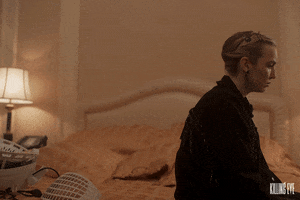
We, the audience, perceive this lack of vitality oozing into the entire show, but once you shift what Villanelle represents this is inevitable. Villanelle becomes mundane, and it brings the nostalgia of the force of nature she once was. It leaves a similar taste as the brutal transformation of Alex from despicable nihilistic hedonist into a model citizen in A clockwork orange: a conflicted perverted sadness at the loss of Alex’s authenticity despite him turning into a “better” human being – ingeniously, his redemption was to gain his despicable impulses back.
The initial character design of Villanelle was something unique and authentic. However, In the process of redeeming her, she might become a new iteration of a trope explored several times that simply reflect the current space of female characters and lack conceptual originality. Yet, there is still room for the recuperation of Villanelle’s transgressive power: a subversive redemption. By incorporating the impulsive indulgence and violence back into the character, Villanelle’s arc can be taken somewhere new, complex and truly special. A remarkable character we can’t get enough of – like the Devil herself.

#killingeveperspectives#killing eve#killingeve#killing eve retcon#killing eve analysis#killing eve review#villanelle#villanelle analysis
41 notes
·
View notes
Note
How would you, if dropped into queen Elizabeth 1st’s first year as queen, go about getting better rights for women, children, and peasants? Without bug backlash from the lords
If it’s her very first year, and you’re expecting me to use the queen’s influence...I wouldn’t have a chance. It took Elizabeth quite a lot of careful verbal dancing, cadjoling, persuading, and subtle manipulating for several years before she became the strong ruler we know and revere today.
If I tried to do it myself, on my own...I would not succeed that way, either.
If I had a (nonviolent) army of volunteers, all believing in the same goal, and all armed with the knowledge of what to do...I’d have us spread out across the land, taking up residency in various towns and villages and hamlets, talking to all the women, making friends, bringing little innovations to make lives better, very carefully couched in terms that the locals would understand (and hopefully not fear nor decry as witchcraft). We’d also make friends with the ladies (noblewomen) as well as the lower classes, being careful to be fountains of wisdom and kindness and helpfulness...and educating the women on the sly.
And then every time the men did something that basically treated women and children like chattel, talk very quietly about how if women were in charge of our own lives, like men are, things would be better. We’d talk about how when--not if, but when--women are given the same opportunities as men, we can excel just like men can excel...and how some men, even with opportunities and education, can fail...just as women without those things are perceived to be failures.
And after about 5-8 years of this polite subtle subversion, start talking about how absolutely indispensible “women’s work” truly is, and how if we just...stopped doing our work...it would bring the whole kingdom to a halt. Of course, the subject of being beaten for such “insolence” would come up...but we’d also give suggestions on how to avoid that, how to counter it, and that special little spot on the inner biceps of a man’s arm where if you pinch it, it is DEBILITATINTLY PAINFUL (due to a nerve that runs close to the surface).
You see, when hauled into court to testify, if a woman says, “My husband/father/brother picked up a rod and beat me with it, so I grabbed the rod and beat him back / punched him / kicked him,” that’s against the law and a woman could be severely punished. But if the woman says simply, “I pinched him,” ...well, any man who complains about being pinched would be laughed out of court. Plus of course simple maneuvers to use an attacker’s force against them--tripping them, flipping them, sidestepping and giving a little extra push to ram them into a wall or a table or whatever, “Well, he swung at me, and missed, and I tried to catch him, but he tripped!”
But either way, it would build to a day when, “Women, it is time to demonstrate our power, and claim our rights... Let me tell you about something called a ‘general strike’...”
And the sheer chaos of women NOT doing their work, of demanding equal rights under the law, equal status...or be forced to do without the equal labor women put into the sheer necessity of survival...? If you get the noblewomen, the craftswomen, the merchant women, the peasant women all banding together to demand their rights, and refusing to work until they are acknowledged as equals...? THAT would change everything.
...Of course, the trick is to re-educate women to understand that the Bible verses stating women are not to be equals were warped the early centuries of the Church toward misogyny. The earliest writings all had women being equal with men...so that putative army of revolutionaries would need to have copies of these early writings to read from...
It would be dangerous, but doable, if done that way.
If not...the social, political, cultural, and legislative rulings of the era would make it difficult to effect top-down change.
...Though if it were in the later years of Queen Elizabeth’s reign, it’d be a little bit easier (not easy, but easier), and the queen herself could be approached for lending resources and so forth.
2 notes
·
View notes